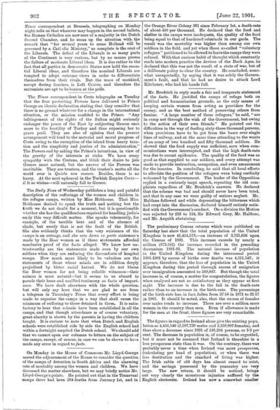Mr. Brodrick in reply made a fair and temperate statement
of the facts. He justified, the camps of refuge both on political and humanitarian grounds, as the only means of keeping certain women from acting as providers for the enemy, and as the best method of preserving others from famine. "A large number of these refugees," he said, "are, in camp not through the wish of the Government, but owing to the action of their own friends." He pointed out the difficulties in the way of feeding sixty-three thousand persons, when provisions have to be got from the bases over single lines of railway, and at the same time attending to the wants of an army of two hundred and fifty thousand soldiers. He showed that the food supply was sufficient, save when com- ruimications were interrupted, and that the high death-rate was due to recent epidemics. The quality of the food. was as good as that supplied to our soldiers, and every attempt was made to provide instruction, occupation, and even amusement for the inmates. In concluding, he said that all local efforts to alleviate the potation of the refugees were being cordially welcomed by the Government. The leader of the Opposition replied in a curiously inept speech, repeating the old com- plaints regardless of Mr. Brodrick's answers. He declared that the scheme was bad and should never have been tried, and that in any case we were guilty of serious neglect. Mr. Haldane followed and while deprecating the bitterness which had crept into the discussion, declared himself entirely satis- fied with the Government's conduct. On a division the Motion was rejected by 253 to 134, Sir Edward Grey, Mr. Haldane, and Mr. Asquith abstaining.










































 Previous page
Previous page